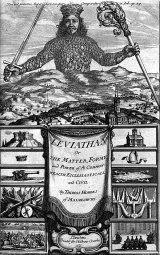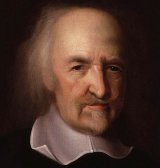Leviathan Page #6
Leviathan or The Matter, Forme and Power of a Common-Wealth Ecclesiasticall and Civil—commonly referred to as Leviathan—is a book written by Thomas Hobbes (1588–1679) and published in 1651 (revised Latin edition 1668). Its name derives from the biblical Leviathan. The work concerns the structure of society and legitimate government, and is regarded as one of the earliest and most influential examples of social contract theory.
Abuses Of Speech To these Uses, there are also foure correspondent Abuses. First, when men register their thoughts wrong, by the inconstancy of the signification of their words; by which they register for their conceptions, that which they never conceived; and so deceive themselves. Secondly, when they use words metaphorically; that is, in other sense than that they are ordained for; and thereby deceive others. Thirdly, when by words they declare that to be their will, which is not. Fourthly, when they use them to grieve one another: for seeing nature hath armed living creatures, some with teeth, some with horns, and some with hands, to grieve an enemy, it is but an abuse of Speech, to grieve him with the tongue, unlesse it be one whom wee are obliged to govern; and then it is not to grieve, but to correct and amend. The manner how Speech serveth to the remembrance of the consequence of causes and effects, consisteth in the imposing of Names, and the Connexion of them. Names Proper & Common Universall Of Names, some are Proper, and singular to one onely thing; as Peter, John, This Man, This Tree: and some are Common to many things; as Man, Horse, Tree; every of which though but one Name, is nevertheless the name of divers particular things; in respect of all which together, it is called an Universall; there being nothing in the world Universall but Names; for the things named, are every one of them Individual and Singular. One Universall name is imposed on many things, for their similitude in some quality, or other accident: And whereas a Proper Name bringeth to mind one thing onely; Universals recall any one of those many. And of Names Universall, some are of more, and some of lesse extent; the larger comprehending the lesse large: and some again of equall extent, comprehending each other reciprocally. As for example, the Name Body is of larger signification than the word Man, and conprehendeth it; and the names Man and Rationall, are of equall extent, comprehending mutually one another. But here wee must take notice, that by a Name is not alwayes understood, as in Grammar, one onely word; but sometimes by circumlocution many words together. For all these words, Hee That In His Actions Observeth The Lawes Of His Country, make but one Name, equivalent to this one word, Just. By this imposition of Names, some of larger, some of stricter signification, we turn the reckoning of the consequences of things imagined in the mind, into a reckoning of the consequences of Appellations. For example, a man that hath no use of Speech at all, (such, as is born and remains perfectly deafe and dumb,) if he set before his eyes a triangle, and by it two right angles, (such as are the corners of a square figure,) he may by meditation compare and find, that the three angles of that triangle, are equall to those two right angles that stand by it. But if another triangle be shewn him different in shape from the former, he cannot know without a new labour, whether the three angles of that also be equall to the same. But he that hath the use of words, when he observes, that such equality was consequent, not to the length of the sides, nor to any other particular thing in his triangle; but onely to this, that the sides were straight, and the angles three; and that that was all, for which he named it a Triangle; will boldly conclude Universally, that such equality of angles is in all triangles whatsoever; and register his invention in these generall termes, Every Triangle Hath Its Three Angles Equall To Two Right Angles. And thus the consequence found in one particular, comes to be registred and remembred, as a Universall rule; and discharges our mentall reckoning, of time and place; and delivers us from all labour of the mind, saving the first; and makes that which was found true Here, and Now, to be true in All Times and Places. But the use of words in registring our thoughts, is in nothing so evident as in Numbering. A naturall foole that could never learn by heart the order of numerall words, as One, Two, and Three, may observe every stroak of the Clock, and nod to it, or say one, one, one; but can never know what houre it strikes. And it seems, there was a time when those names of number were not in use; and men were fayn to apply their fingers of one or both hands, to those things they desired to keep account of; and that thence it proceeded, that now our numerall words are but ten, in any Nation, and in some but five, and then they begin again. And he that can tell ten, if he recite them out of order, will lose himselfe, and not know when he has done: Much lesse will he be able to add, and substract, and performe all other operations of Arithmetique. So that without words, there is no possibility of reckoning of Numbers; much lesse of Magnitudes, of Swiftnesse, of Force, and other things, the reckonings whereof are necessary to the being, or well-being of man-kind. When two Names are joyned together into a Consequence, or Affirmation; as thus, A Man Is A Living Creature; or thus, If He Be A Man, He Is A Living Creature, If the later name Living Creature, signifie all that the former name Man signifieth, then the affirmation, or consequence is True; otherwise False. For True and False are attributes of Speech, not of things. And where Speech in not, there is neither Truth nor Falshood. Errour there may be, as when wee expect that which shall not be; or suspect what has not been: but in neither case can a man be charged with Untruth. Seeing then that Truth consisteth in the right ordering of names in our affirmations, a man that seeketh precise Truth, had need to remember what every name he uses stands for; and to place it accordingly; or els he will find himselfe entangled in words, as a bird in lime-twiggs; the more he struggles, the more belimed. And therefore in Geometry, (which is the onely Science that it hath pleased God hitherto to bestow on mankind,) men begin at settling the significations of their words; which settling of significations, they call Definitions; and place them in the beginning of their reckoning. By this it appears how necessary it is for any man that aspires to true Knowledge, to examine the Definitions of former Authors; and either to correct them, where they are negligently set down; or to make them himselfe. For the errours of Definitions multiply themselves, according as the reckoning proceeds; and lead men into absurdities, which at last they see, but cannot avoyd, without reckoning anew from the beginning; in which lyes the foundation of their errours. From whence it happens, that they which trust to books, do as they that cast up many little summs into a greater, without considering whether those little summes were rightly cast up or not; and at last finding the errour visible, and not mistrusting their first grounds, know not which way to cleere themselves; but spend time in fluttering over their bookes; as birds that entring by the chimney, and finding themselves inclosed in a chamber, flitter at the false light of a glasse window, for want of wit to consider which way they came in. So that in the right Definition of Names, lyes the first use of Speech; which is the Acquisition of Science: And in wrong, or no Definitions' lyes the first abuse; from which proceed all false and senslesse Tenets; which make those men that take their instruction from the authority of books, and not from their own meditation, to be as much below the condition of ignorant men, as men endued with true Science are above it. For between true Science, and erroneous Doctrines, Ignorance is in the middle. Naturall sense and imagination, are not subject to absurdity. Nature it selfe cannot erre: and as men abound in copiousnesse of language; so they become more wise, or more mad than ordinary. Nor is it possible without Letters for any man to become either excellently wise, or (unless his memory be hurt by disease, or ill constitution of organs) excellently foolish. For words are wise mens counters, they do but reckon by them: but they are the mony of fooles, that value them by the authority of an Aristotle, a Cicero, or a Thomas, or any other Doctor whatsoever, if but a man.
Translation
Translate and read this book in other languages:
Select another language:
- - Select -
- 简体中文 (Chinese - Simplified)
- 繁體中文 (Chinese - Traditional)
- Español (Spanish)
- Esperanto (Esperanto)
- 日本語 (Japanese)
- Português (Portuguese)
- Deutsch (German)
- العربية (Arabic)
- Français (French)
- Русский (Russian)
- ಕನ್ನಡ (Kannada)
- 한국어 (Korean)
- עברית (Hebrew)
- Gaeilge (Irish)
- Українська (Ukrainian)
- اردو (Urdu)
- Magyar (Hungarian)
- मानक हिन्दी (Hindi)
- Indonesia (Indonesian)
- Italiano (Italian)
- தமிழ் (Tamil)
- Türkçe (Turkish)
- తెలుగు (Telugu)
- ภาษาไทย (Thai)
- Tiếng Việt (Vietnamese)
- Čeština (Czech)
- Polski (Polish)
- Bahasa Indonesia (Indonesian)
- Românește (Romanian)
- Nederlands (Dutch)
- Ελληνικά (Greek)
- Latinum (Latin)
- Svenska (Swedish)
- Dansk (Danish)
- Suomi (Finnish)
- فارسی (Persian)
- ייִדיש (Yiddish)
- հայերեն (Armenian)
- Norsk (Norwegian)
- English (English)
Citation
Use the citation below to add this book to your bibliography:
Style:MLAChicagoAPA
"Leviathan Books." Literature.com. STANDS4 LLC, 2024. Web. 22 Dec. 2024. <https://www.literature.com/book/leviathan_192>.




Discuss this Leviathan book with the community:
Report Comment
We're doing our best to make sure our content is useful, accurate and safe.
If by any chance you spot an inappropriate comment while navigating through our website please use this form to let us know, and we'll take care of it shortly.
Attachment
You need to be logged in to favorite.
Log In